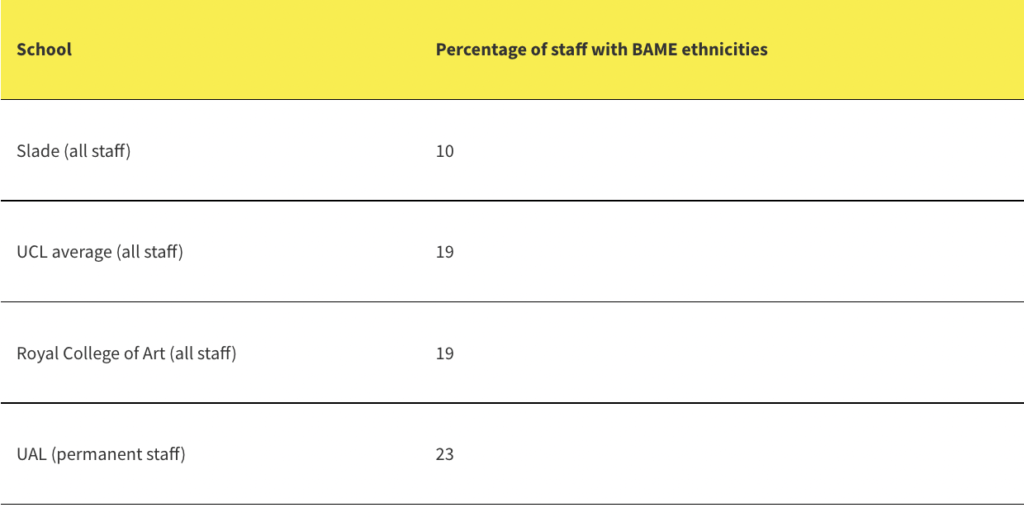
Report found a ‘high-stress culture’ and racial inequality rife at UCL’s Slade art school
The faculty Dean said: ‘Change must start now’
An independent review into learning and working environment at UCL’s Slade School of Fine Art found that “unprofessional workplace behaviours and racial disparities characterise the Slade’s high-stress culture.”
This investigation was commissioned by UCL this February following student occupations of Slade in 2018 and last December, during which banners with statements such as “we demand transparency”, “support POC staff and students,” and “make anti-discriminatory training mandatory” covered the art school.
Key issues found by the report include workplace miscommunication, lack of leadership, and inadequate representation of people of colour. But it also found that “Slade’s staff and students were committed to the School and to creating a positive learning and working environment for all.”
The Executive Dean of the Faculty of Arts and Humanities said in an email to students: “The report makes clear that genuine and meaningful change is needed to create a School in which everyone feels respected and valued. This change must start now.”
The investigation and report were done by external organisation Nous with anonymous interviews with Slade’s staff and students.
It delved into two primary areas of concerns that have been highlighted by the student group Slade Action, which are the lack of diversity amongst teaching staff and systemic miscommunication and disorganisation at the school.
On the first issue, Nous found that the number of people of colour employed by the art school was significantly lower both compared to other London art schools and the UCL average.
While recognising Slade’s effort to recruit more staff of colour over the past decade, the report pointed out how the pandemic and the resulting halt in recruitment saw a rise in BAME staff being hired on insecure, temporary contracts to “fill positions.”
Even if their contracts are permanent, two subtypes of these contracts mean “some lecturers are paid to undertake their research and others are not,” and participants claimed staff of colour are often the ones being subjugated to less stable contracts.
The same issue of racial disparities and discrimination also affects students. Despite people of colour being better represented in the student body than the staff, those involved in the review described incidents including “inappropriate references to the works of art produced by students of colour, microaggressions relating to the ethnicities of staff and students, and biased treatment towards White students.”
Adding onto that is the fact that students and staff are not accessing the school’s report process for these incidents due to fear of repercussions and lack of awareness. These lead of people of colour feeling like they “shoulder a heavy burden” for the racial disparities at Slade.

Data sources: Slade, UCL, Royal College of Art, UAL
The investigation also found “unprofessional workplace behaviours” rife at the school.
Slade Action claimed in an open letter before the report was published that “repeated failures of communication, inadequate planning, and decisions about the future of the school and its structure have been made without genuine consultation with staff and students.”
Staff who participated in the Nous investigation also described the communication within the school as “stressful” and having “everyone on edge.” One staff member said: “Leadership team wildly large and dysfunctional. There is a bi-weekly meeting with 15 people where things simply don’t get done.” Another also described how the SRCG, which started as an anti-racism initiative led by staff at the Slade, has become “an echo chamber of people complaining about their jobs.”
Nous recommended several measures towards improving the issues they’ve found.
On the racial disparities, Nous suggested creating anti-racism systems within the institution, providing diversity training for all staff, improving conditions for teaching staff on temporary contracts, and increasing representation of staff and students of colour.
And for the organisational dysfunction, they urged Slade to provide leadership training and clear outline of responsibilities to the management team and support to all staff affected by miscommunication.
In response, a UCL spokesperson said: “Over the next few weeks, Professor Stella Bruzzi, Dean of the Faculty of Arts and Humanities, and members of the Steering Group will be listening carefully and talking to as many students and staff at the Slade as possible to create an open dialogue together about the Slade’s culture in the future.
“We want to empower and support our community to come together and help design changes that ensure an inclusive, safe environment.
“We have reached out to Slade students and staff directly inviting them to participate in these conversations at drop-in sessions this month, and about our plans to establish internal action groups that together will work to create change and reimagine the education experience and environment at the Slade, based on the key themes of the report.”
Professor Stella Bruzzi, Dean of the Faculty of Arts & Humanities, said: “The culture of poor workplace behaviours identified in this report, compounded by an environment of racial disparities and inequities, is unacceptable and completely at odds with UCL’s values.
“I apologise unreservedly to all those students and staff who have been affected. Our priority is to ensure these issues are addressed immediately and to improve the strategic vision, leadership and working and learning environments at the Slade.
“I will be leading a Steering Group, supported by a number of action groups, which will focus on the report’s recommendations and key themes, and aim to change and reimagine the education experience and environment at the Slade.”
Related stories recommended by this writer:
• Students occupy Slade School of Fine Art in protest of institutional racism
• UCL apologises for ‘culture of bullying and sexual misconduct’ at architecture school
• This is what it’s actually like being a person of colour at London university









































